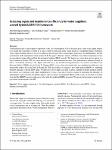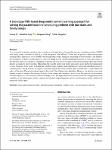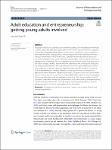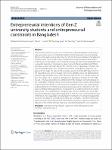Search
Author
- Osman, Ahmed I. (5)
- Daqing, Ma (3)
- Jorgensen, Ed (3)
- Li, Yan (3)
- next >
Subject
- kinh tế (26)
- Economics (12)
- programming (10)
- XRD (10)
- next >
Date issued
- 2020 - 2025 (2128)
- 2010 - 2019 (129)
- 2000 - 2009 (9)
- 1999 - 1999 (1)
Has File(s)
Search Results
A metropolitan area's water supply is imperative to the city's development. One of the main goals of the water supply utilities is to ensure the availability of water, as a lack of water would cause many social, political, or health problems. Therefore, water supply facilities must be in good condition, efficient preventive maintenance plans must be implemented, and the performance of the maintenance team monitored. In this paper, efficiency indices of Tehran water utility maintenance teams are investigated using different Data Envelopment Analysis (DEA) models. The final scores were then used as inputs to a Fuzzy Inference System (FIS) to assess the efficiency of these maintenance units. Two performance indicators based on DEA, "Availability efficiency" and "Repair time efficiency"... |
This paper proposes an explanatory model of the intention to pay for fair trade food products based on the stimulus-organism-response (S-O-R) theory. The research aims are to test the effects of general attitudes toward sustainable food products on the valuation of fair-trade food products, to study the effects of emotions on willingness to pay for fair trade food products and to analyse the mediating role of product evaluation and emotions. The proposed model was tested using an ordinary least squares estimation and an analysis combining the properties of parallel and serial mediation on a representative sample of 305 consumers in the Basque Country (Spain). Descriptive analyses indicate that respondents had a favourable attitude toward sustainable products and positively valued fa... |
Stock price responses of soccer clubs to national and international tournaments have been interpreted in light of fan investors who are prone to emotions. We employ Champions League and Europa League fixtures between 2004 and 2020 to investigate whether postmatch stock price responses are driven by emotions. We argue that a soccer club’s relative competitive strength can be a proxy for investors’ emotions, such as rage and disappointment, after losing against a strong opponent, which then leads to abnormal decreases in stock prices. While we find several factors, such as the percentage of shares held by institutional investors less subject to emotions, whose effects on postmatch abnormal returns are in line with rational information processing, our evidence also suggests that the ef... |
In a digital ecosystem where large amounts of data related to user actions are generated every day, important concerns have emerged about the collection, management, and analysis of these data and, according, about user privacy. In recent years, users have been accustomed to organizing in and relying on digital communities to support and achieve their goals. In this context, the present study aims to identify the main privacy concerns in user communities on social media, and how these affect users’ online behavior. In order to better understand online communities in social networks, privacy concerns, and their connection to user behavior, we developed an innovative and original methodology that combines elements of machine learning as a technical contribution. First, a complex netwo... |
To solve the problems of high prediction costs and difficult practices in multi-category product classification in the retail industry, optimize the inventory, and improve resilience, this work introduces a forecasting method for multi-category product sales. The forecasting method divides the data into a category set and a numerical set, uses the stacking strategy, and combines it with catboost, decision tree, and extreme gradient boosting. During the feature engineering process, the ratio and classification features are added to the category feature set; the sales at t are used for training to obtain the prediction at (t + 1); and the features used in the prediction at time (t + 1) are generated by the prediction results at t. The update processes of the two sets are combined to f... |
Despite numerous campaigns, the efforts made not only to inform people of the Strategic Development Goals (SDGs) but also to persuade them to contribute individually to the task of achieving these goals have not yet been sufficient. Namely, awareness of the SDGs remains very low among broad sections of the population. In addition, the statements of these goals are not understood in many cases (World Economic Forum 2020). Finally, behavioural changes based on relevant insights have hitherto been insufficient. This situation is also reflected in the UN report, which attests to the insufficient progress made with regard to achieving the SDGs in most countries and notes that in 2020 and 2021, the SDG Index Score even stagnated (Sachs et al., 2022). |
As an essential scheduling problem with several practical applications, the parallel machine scheduling problem (PMSP) with family setups constraints is difficult to solve and proven to be NP-hard. To this end, we present a deep reinforcement learning (DRL) approach to solve a PMSP considering family setups, aiming at minimizing the total tardiness. The PMSP is first modeled as a Markov decision process, where we design a novel variable-length representation of states and actions, so that the DRL agent can calculate a comprehensive priority for each job at each decision time point and then select the next job directly according to these priorities. Meanwhile, the variable-length state matrix and action vector enable the trained agent to solve instances of any scales. To handle the v... |
This paper reflects on adult education and the fostering of an entrepreneurial mindset. It solicits roles adult education, especially the non-formal education (NFE), could play in fostering entrepreneurial mindset of young adults. It examines short-to-medium, and long-term plans of young adults in nurturing growth and enterprising mindsets through involvement in NFE endeavours. It probes into entrepreneurial opportunities and challenges in the communities that young adults could recognise and create enterprises for themselves. This is a narrative case study which purposively selected, as the unit of analysis, an adult learner who was operating a micro-enterprise and pursuing a degree programme at Accra Learning Centre. |
One promise of computational decision support is enabling better solutions in interactions and social exchange by supporting human strengths (e.g. intuitive decision-making) with formal procedures. This study investigates whether mathematical post-negotiation procedures can guide parties to an efficient negotiation result and thus overcome the shortcomings of human-only approaches in the situation of power asymmetry. The results show that (a) an increase in power by means of a rise in issue authority for one of the two parties does not lead to an increase in humans’ negotiation efficiency, (b) the use of mathematical post-negotiation procedures eminently improves the overall results and (c) the powerful party is likely to benefit most from applying a neutral post-negotiation procedu... |
This research examines a variety of restrictions preventing Bangladeshi youth, particularly Generation Z university students, from becoming involved in entrepreneurship. Moreover, the study examines the influence of Entrepreneurial Attitude (EA), Subjective Entrepreneurial Norms (SEN), Entrepreneurial Perceived Behavioural Control (EPBC), and Entrepreneurial Resilience (ER) on Entrepreneurial Intention (EI) of Bangladeshi Gen Z university students. A systematic literature review methodology following PRISMA procedure was performed to identify the relevant articles. A quantitative method with a positivism philosophy, cross-sectional time horizon and deductive approach was applied to the study. The data of 206 university students from the BBA department of ten universities were collec... |










